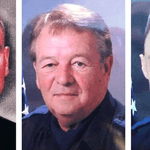
Nathaniel Woods (pictured, left) did not shoot Alabama police officers Charles Bennett, Carlos “Curly” Owen, and Harley Chisholm III (pictured left to right, below). But because of alleged police misconduct, incompetent representation, and Alabama law allowing death verdicts based on non-unanimous jury votes, he faces execution on March 5, 2020 for their deaths.
Prosecutors acknowledge that Woods’ co-defendant, Kerry Spencer, shot the officers in an incident in a drug house on June 17, 2004. Spencer also admits to having shot the officers, but says he did so in self-defense after they had beaten Woods during a shakedown and pointed a gun at him. Spencer also was sentenced to death — also after a non-unanimous jury vote. However, he received better representation at trial and on appeal and is still years from a possible execution.
Woods’ racially charged convictions and death sentences are tainted by claims of police corruption, intimidation of witnesses, and inadequate representation. Knowing he was not the shooter, prosecutors offered Woods a plea deal for 20 – 25 years, but his trial lawyer advised him not to take it, misinforming him that he could not be convicted of capital murder as an accomplice. After Woods, who is Black, turned down the offer, prosecutors claimed at trial that he had been the mastermind of a plan to kill the three white officers because he supposedly hated police.
Woods argues that he received inadequate representation at trial and during his appeals. Despite the obvious conflict of interest, he was appointed a lawyer who, until the eve of trial, was also representing Spencer. The lawyer missed filing deadlines and prematurely presented other claims without sufficient evidence, thereby barring their consideration in the future after supporting evidence had been developed. Woods was then assigned new lawyers who failed to challenge his conviction in state court.

In an interview with The Appeal, J.D. Lloyd, Woods’ third appeals lawyer, said “[Woods’] case has just been so mishandled and it’s just a shame that we’re at the point of executing a man who was not the triggerman, whose case has so many issues that no court has considered.”
Background on the case
Woods and Spencer shared a home with Tyran “Bubba” Cooper, who dealt drugs from the house. According to a 2012 affidavit, Cooper says he was paying off Officers Owen and Chisholm $300 – 400 per week in 2002 “to protect my drug business and to make sure that no one else sold drugs in my area of Birmingham.” Cooper was charged with attempted murder in April 2004, and he says the officers then raised their price. He had trouble making the payments, so they would come to the house looking for him and sometimes got in arguments with Woods.
On the day of the shootings, according to testimony from Woods’ trial, police visited the house three times. Spencer said Officer Owen came to the house alone between 6 and 8 a.m., then came back later in the morning looking for Cooper. According to Officer Michael Collins, who survived the shooting, they had an argument with Woods, after which he, Owen, and Chisholm ran Woods’ name through a database of outstanding warrants. They found a misdemeanor arrest warrant for Woods and, after an administrative delay, returned to serve the warrant, Collins said.
No warrant was recovered from the scene, and eyewitnesses did not report seeing any of the officers holding a piece of paper. Collins and Spencer gave differing accounts of the officers’ third visit. According to Collins, Woods surrendered to police and was upright and not handcuffed when Spencer opened fire on the officers. Spencer says he awoke to a commotion in the house and saw Woods holding his face in pain after having been beaten by the officers, then saw one of the officers pointing a gun at him. He insists he acted in defense of himself and Woods. “I didn’t mean to kill nobody, man,” he said on the witness stand. “You know, this was a decision I had to make to stay alive or be shot, and I did what I had to do.” He later described the incident as “the scariest moment of my life.”
Cooper did not testify at the trials of Woods and Spencer, later saying police had threatened him into silence. Woods’ girlfriend testified against him, saying he had made comments about his hatred of police. But even before the trial, she recanted. “I made that up. I told y’all what you wanted to hear,” she said at a pretrial hearing. Woods’ appeal alleges that police threatened her with charges of parole violations if she did not testify. At Woods’ trial, the judge refused to allow evidence of police misconduct to be presented.
Speaking to The Appeal, Spencer said: “Nate ain’t done nothing. … [He] is actually 100 percent innocent. All he did that day was get beat up and he ran.”
Lauren Gill, Alabama prepares to execute a man whose case is haunted by claims of police misconduct, The Appeal/AL.com, February 24, 2020; Anne Branigin, Alabama Prepares to Execute Man Found Responsible for Murdering 3 Police Officers — Without Pulling a Single Trigger, The Root, February 25, 2020.


